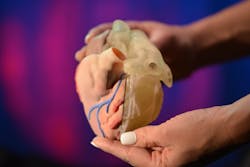Bespoke, 3D-printed anatomical models enhance patient care
By Bruce Geiselman
Ricoh USA, a digital services company, is working with 3D printer OEM Stratasys to provide point-of-care anatomical modeling services to health-care facilities.
Last summer, Ricoh launched its Ricoh 3D for Healthcare program, which uses Stratasys technology to give more medical providers and hospitals access to 3D-printed, patient-specific anatomical models.
The models can be used for various purposes, such as teaching and helping surgeons explain procedures to patients.
Soon, surgeons will be able to use the models in preparing and planning for surgical procedures for orthopedic and craniomaxillofacial applications. Diagnostic models for orthopedic and craniomaxillofacial applications are pending 510(k) clearance from the Food and Drug Administration.
Ricoh provides a complete solution for health-care providers wanting either to establish a 3D printing lab in their own facilities or to use Ricoh’s facility in suburban Cleveland, where the company produces the models on demand and then delivers them to the health-care provider. Often, health-care systems use both options, said Gary Turner, managing director of additive manufacturing in North America for Ricoh. Both options protect patients’ privacy by using HIPAA-compliant software and processes and anonymizing data, according to the companies.
If a health-care provider wants to establish its own 3D printing lab — also called a point-of-care manufacturing center — Ricoh brings onsite the personnel, the equipment and the software to produce anatomical models. The health-care institution also has access to Ricoh’s centralized production centers and therefore more capacity for complex projects or higher-than-normal demand.
Ricoh uses the Stratasys J750 Digital Anatomy printer and the smaller, less-expensive Stratasys J5 MediJet printer to create models for the Ricoh 3D for Healthcare program. The printers create lifelike models that can reflect an individual patient’s pathology and be physically manipulated like human tissue. The Stratasys printers, using a variety of proprietary polymeric materials, can produce models that mimic human tissues and bones.
Stratasys’ TissueMatrix is a soft and contractile material used to create models that feel and behave like organ tissue when force is applied, according to the company. BoneMatrix is strong and flexible and can be used to create complex material depositing patterns that mimic porous bone structures, fibrotic tissues and ligaments. It behaves like bone when force is applied, such as during discectomy, drilling, reaming or sawing. The company’s GelMatrix material allows for the printing of large and small complex vascular structures.
Ricoh’s goal is to democratize access to anatomical modeling services, making them available to smaller and rural hospitals, Turner said. Only about 5 percent to 10 percent of hospitals today have the resources to 3D print their own models. Ricoh hopes to offer a solution to the rest.
“To date, access to anatomic models at point-of-care locations has been limited to large hospitals and health-care facilities,” Turner said. “Our cost-effective solution expands access for health-care providers of all sizes.”
Ricoh and Stratasys are providing a turnkey solution and removing many of the barriers to access, Turner said.
“They don’t have to purchase equipment because we bring the equipment,” Turner said. “They don’t have to purchase the software because that’s part of the package. They don’t have to hire and train personnel because that’s included. They don’t have to build a quality management system on their own.”
Ricoh’s technology integrates with IBM iConnect Access from IBM Watson Health, a diagnostic viewer and image exchange platform that many health-care providers already use, making it easy for clinicians to incorporate it into their existing workflow. Once a health-care professional uses the interactive segmentation tool within IBM iConnect Access and submits a request for a 3D-printed model, Ricoh facilitates the entire development process on the centralized HIPAA-compliant platform to produce and deliver accurate models.
Contact:
Ricoh USA Inc., Exton, Pa., 610-296-8000, www.ricoh-usa.com/en/industries/healthcare/3d-printing-for-healthcare
Stratasys Ltd., Eden Prairie, Minn., 952-937-3000, www.stratasys.com
Bruce Geiselman, senior staff reporter
About the Author
Bruce Geiselman
Senior Staff Reporter Bruce Geiselman covers extrusion, blow molding, additive manufacturing, automation and end markets including automotive and packaging. He also writes features, including In Other Words and Problem Solved, for Plastics Machinery & Manufacturing, Plastics Recycling and The Journal of Blow Molding. He has extensive experience in daily and magazine journalism.
